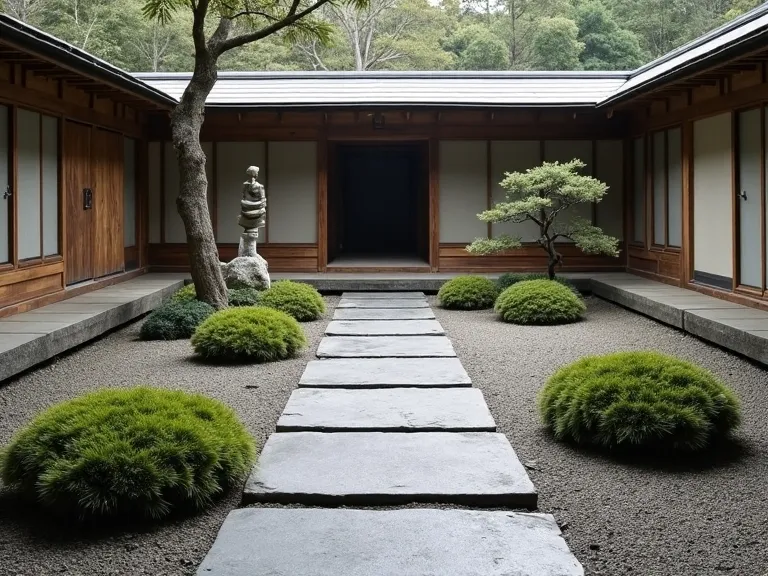In a world dominated by the cult of perfection, where polished selfies and pristine social media interiors become the measure of our worth, it is increasingly difficult to find peace of mind. We strive for unattainable ideals, while true wisdom lurks in the shadows of imperfection. As the sages of old would say, “there is no perfection except that which embraces its imperfections.” Wabi-sabi, an ancient Japanese philosophy, offers us a path free from the confines of perfectionism, where cracked ceramics and worn wood carry greater depth than sterile novelty.
Have you ever wondered why you feel overwhelmed by the constant pursuit of perfection? Why is it that the imperfect often touches you more deeply than the flawless? In this article, we will explore how the philosophy of wabi-sabi can become your guide in accepting imperfection—not as a failure, but as a source of authentic beauty. You will learn practical ways to bring this “imperfection” into your home, work, and relationships. Instead of fighting the passage of time, you will learn to see value in the patina of experience, finding harmony between striving for growth and accepting what is.
The basic assumptions of the Wabi-Sabi philosophy
Wabi-Sabi, one of the most fascinating concepts of Japanese aesthetics, is absolute revolution in the perception of beauty. 🤔 Unlike Western ideals that strive for perfection, this philosophy celebrates imperfections, considering them a testament to authenticity and the natural cycle of life. Wabi refers to simplicity, modesty, and harmony with nature, while Sabi refers to the charm that objects gain over time.
The first fundamental assumption of Wabi-Sabi is acceptance Mono no unaware – the transience of all things. 😮 Every scratch, crack or sign of wear is not a defect, but a valuable record of time that adds character and depth to objects. This understanding of transience is incredibly liberating – it frees us from the impossible pursuit of perfection, which in reality never exists in nature.
The second pillar of this philosophy is simplicity and minimalism. Wabi-Sabi rejects everything unnecessary, leaving only what is truly important. In a world filled with consumerism and excess, this principle is like a refreshing breath of clean, mountain air! Everyday objects, made by hand, from natural materials, have a soul unattainable for mass production.
The third aspect is a deep connection to nature. 😊 Wabi-Sabi recognizes that we are an integral part of the natural world, subject to the same cycles of birth, growth, aging, and transience. Rather than fighting these processes, this philosophy encourages us to celebrate them. As the Japanese proverb says:
“Cracks in ceramic filled with gold become part of the history of the object, not its defect.”
Practicing Wabi-Sabi in your daily life means seeing beauty in the simplest of moments—in a cup of tea whose rim has been chipped by years of use, in a wooden table bearing the marks of family meals, or in the asymmetrical shape of a hand-made vessel. These imperfections are not flaws—they are the most precious treasures, telling the story of the life that has flowed through them.
Wabi-Sabi also teaches us that authentic happiness does not come from having perfect objects, but from deeply appreciating things for what they are. In a world that screams perfection through thousands of ads every day, this ancient philosophy whispers a soothing truth – it is in imperfections that the deepest beauty, the most authentic joy, and the truest wisdom lie. 🤔
Transience and imperfection as elements of the natural cycle of life
In the philosophy of wabi-sabi, transience is not a cause for sadness, but a source of profound beauty. Like autumn leaves that whisper a colorful melody before falling, our lives gain value precisely because of their temporariness. Japanese tradition teaches us that imperfections – those tiny cracks, asymmetries, and unevennesses – are not flaws, but unique traces of authenticity, which tell the story of an object or person.
Every wrinkle is a record of a smile, every scratch on the furniture a testament to years of use.
When we embrace wabi-sabi, we see harmony in the rough texture of time that leaves its mark on everything. The touch of a well-worn wooden spoon can be sweeter than perfectly smooth plastic, and the quiet sound of cracking ceramic during a tea ceremony sounds like the warm sigh of nature itself. It is in these moments when we see value in the incomplete and transient, we discover the deepest truth about life – that its transience is not only inevitable, but also necessary for truly appreciating each moment.
Authenticity and simplicity in Wabi-Sabi
If imperfection could speak to us, it would whisper in a soft voice: "Don't hide me, let me exist in full light". In Wabi-Sabi philosophy, imperfection is not a flaw, but a living thing that breathes authenticity and attracts the eye with its untamed sincerity. Every crack, fracture, or asymmetry becomes a conscious expression of character, proudly telling the story of its existence as the shadows of first memories lie on the surface of things.
Simplicity, which is the heart of Wabi-Sabi, is not emptiness, but a wise teacher patiently showing the way to the essence. Objects imbued with the spirit of Wabi-Sabi do not scream for attention – they remain in quiet contemplation, inviting us to discover their inner beauty. As morning light filters through the windows, these inconspicuous objects come to life, manifesting their presence not through garishness, but through a subtle reminder of the value of authentic existence.
In an age where digital perfection floods our senses, the soul of Wabi-Sabi wanders among us like a sage from a distant land, reminding us that true beauty bears the traces of time on its face. A ceramic bowl with an irregular rim feels proud of its uniqueness, wooden furniture with visible grain rejoices in its naturalness, and fabrics with uneven textures tell the stories of the hands that created them. In this philosophy, each object gains awareness of the value of its authentic character, as night slowly covers the world with a blanket of darkness.
Practical Applications of Wabi-Sabi
The Wabi-Sabi philosophy finds wide application in today's fast-paced world. The Japanese concept of beauty in imperfection offers us a new perspective on everyday life. Introducing this philosophy into our reality brings numerous benefits: reduced stress, greater mindfulness, and deeper satisfaction in simple things.
In the home, Wabi-Sabi is expressed through the selection of authentic materials and objects. Instead of perfectly matched furniture from stores, it is worth considering: recycled furniture, handmade ceramic vessels or natural fabrics with visible imperfections. Every scratch or imperfection tells the story of the object, giving it a unique character that cannot be replicated in mass production.
In everyday practices, Wabi-Sabi encourages slowing down. Celebrating imperfect moments becomes a source of genuine joy. The Japanese apply this philosophy to many aspects of life: the tea ceremony, the art of ikebana, and the maintenance of the home space. Accepting our own imperfections and those of the world around us leads to deeper inner peace.
Contemporary design also draws inspiration from Wabi-Sabi. Minimalist interiors, natural materials and asymmetrical forms are gaining popularity. Architects and designers are increasingly moving away from sterile, perfect spaces in favor of those with character. Wabi-Sabi reminds us that true beauty lies in authenticity and naturalness, not in the artificial perfection created by social media and advertising.
Wabi-Sabi in design and space arrangement
🍵 Wabi-Sabi is a Japanese philosophy of seeing beauty in imperfection, which revolutionizes the contemporary approach to interior design. About a space that breathes authenticity! Your cracked ceramic vessel is not defective - it carries a history, character and soul that are not found in mass production.
🌿 Designing in the spirit of Wabi-Sabi is a celebration of natural materials and their transformation over time. Wooden countertops with visible knots, linen fabrics with an irregular texture, or hand-formed ceramics - all these elements create a space that exudes peace and authenticity. Imperfection becomes an advantage here, not a disadvantage..
🪨 Matte finishes, earthy colors, and asymmetrical forms are the foundations of this philosophy. Wabi-Sabi teaches us that true beauty lies in subtlety and moderation, not in shiny, perfectly even surfaces. The patina of time, which we so often try to hide, here becomes a valuable attribute.
🕯️ In a world saturated with technology and artificiality, Wabi-Sabi reminds us of the value of simplicity and naturalness. It is not just a style of arrangement, but a way of thinking about the space and objects that surround us. As the Japanese aesthetician Soetsu Yanagi wrote:
"True beauty lies not in perfection, but in sincerity of intention"
.
🌓 You, the time-worn object, are a perfect example of Wabi-Sabi! The true story of life is hidden in your cracks, scratches, and imperfections. When we learn to appreciate these imperfections in our homes, perhaps we will find it easier to accept them in ourselves and others.
Handicraft and the Wabi-Sabi Philosophy
The Japanese philosophy of Wabi-Sabi celebrates the beauty of imperfection and transience. In the world of handicraft, this concept takes on a special meaning. Every handmade item bears traces of the person who created it – subtle irregularities, natural discolorations of the material or minor asymmetries. These “imperfections” are not flaws, but authentic signs of the human hand, which gave the object a soul.
Wabi-Sabi craftsmen do not strive for the sterile perfection of mass production. Instead, they allow materials to speak for themselves. Wood retains its grain and knots, ceramics show the subtle traces of the potter’s fingers, and fabrics the natural irregularities of the weave. Simplicity and functionality go hand in hand with respect for the natural properties of raw materials. In this way, objects are created that not only serve the user, but also tell the story of their creation…
Wabi-Sabi teaches us to see beauty in the imperfect, the impermanent and the incomplete. In a world dominated by mass production, handicraft inspired by this philosophy is a quiet revolution. Objects created by hand age with dignity – patina on metal, abrasions on wood or delicate cracks in ceramics add character to them instead of taking away from their value. It is in these traces of time and use that the true beauty of Wabi-Sabi is revealed.
Practicing craftsmanship in this philosophy requires patience and an acceptance of the unpredictability of the creative process. A craftsman must learn to accept chance as part of creation. Sometimes a crack in the clay or an unplanned smudge of paint can lead to the most interesting effects. In this uncertainty lies freedom from the perfectionism that often paralyzes creativity. Wabi-Sabi reminds us that true mastery is not about eliminating all imperfections, but about being able to appreciate and use them.
Wabi-Sabi as a lifestyle in the modern world
In autumn contemplation, when leaves whirl in the dance of transience, philosophy good morning takes on a special meaning. This Japanese concept, celebrating beauty in imperfection, offers profound wisdom at a time when social media bombards us with images of perfection. Autumn, with its natural transformation and slow death of nature, is a perfect reflection of the principles of wabi-sabi – accepting transience and finding beauty in the fleetingness of the moment.
In a world of digital perfection, we seek authenticity; in the thicket of consumerism, we yearn for simplicity. This is where wabi-sabi comes in with an answer, encouraging us to celebrate our lives as they are – with all their imperfections and cracks. Autumn cleaning can become an opportunity not only to get rid of unnecessary things, but also to consciously choose objects that have a soul and a story – it could be a handmade ceramic mug with a delicate crack or a wooden table bearing traces of family meetings.
As leaves change colors before falling, we can discover beauty in aging; as the autumn sun casts soft light, we can see grace in imperfect shapes. Practicing wabi-sabi in daily life means finding a balance between the desire to grow and accepting limitations, between striving for a better tomorrow and appreciating an imperfect today. As the Japanese proverb goes:
“In imperfection there is perfection, in imperfection there is freedom.”
This wisdom reminds us that authentic life is not about striving for an unattainable ideal, but about accepting and celebrating reality as it is – especially now, when autumn reminds us of the cyclical nature and beauty of transience.
Wabi-Sabi: Finding Beauty in Imperfection
Wabi-sabi philosophy teaches us that true beauty lies in imperfection. By accepting transience as a natural part of life, we gain a new perspective on the reality around us. By seeing value in simplicity, authenticity and usefulness, we open ourselves to a deeper experience of everyday life.
Why is it worth introducing wabi-sabi elements into your life?
- You will regain peace in a world striving for perfection.
- You will develop greater mindfulness and awareness.
- You will learn to appreciate simplicity and functionality.
- You will minimize the stress associated with chasing the ideal.
Start today! Look around you and appreciate the imperfect things that have a story. Choose handmade products over mass production. Slow down and enjoy the moment, accepting its transience.
Frequently asked questions
What exactly is the Wabi-Sabi philosophy and where does it come from?
Wabi-Sabi is a Japanese aesthetic philosophy that celebrates the beauty hidden in imperfection, transience, and incompleteness. It originates from Buddhist teachings about the impermanence of all things and has been shaped by Japanese culture, particularly evident in tea ceremony, interior design, and ceramic art.
How can I incorporate Wabi-Sabi principles into my daily life?
You can introduce Wabi-Sabi into your life by appreciating simple, natural objects instead of perfect, mass-produced ones. Try to accept imperfections in your environment, treating them as unique qualities rather than flaws. Practice mindfulness and conscious slowing down to see beauty in the fleeting moments of everyday life.
Why is Wabi-Sabi gaining popularity in today's world?
Wabi-Sabi is gaining popularity as a counterbalance to the culture of perfectionism and consumerism that dominates our world today. In a digital age and social media that promote unrealistic standards of perfection, a philosophy that embraces imperfection offers a liberating approach to life. It also provides an answer to the growing desire for authenticity, sustainability, and a deeper connection with nature.







